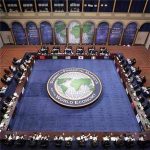 Rio de Janeiro: At the Third Forum of the Alliance of Civilizations initiative, it was revealed this week that seventy-five per cent of the world’s conflicts have a cultural dimension. The UN Secretary-General has called for the international community to bridge the divides that separate peoples and cultures, declaring that the citizens of the world must “unlearn” stereotypes and eliminate feelings of national, racial and religious superiority.
Rio de Janeiro: At the Third Forum of the Alliance of Civilizations initiative, it was revealed this week that seventy-five per cent of the world’s conflicts have a cultural dimension. The UN Secretary-General has called for the international community to bridge the divides that separate peoples and cultures, declaring that the citizens of the world must “unlearn” stereotypes and eliminate feelings of national, racial and religious superiority.
The Alliance of Civilizations is a five-year-old initiative set up by Spain and Turkey, running under United Nations auspices. Its aim is “to overcome prejudice among nations, cultures and religions”.
At its Third Forum in Rio de Janeiro, Brazil, today (Friday), it was revealed that 75% of conflicts are based upon notions of racial or religions superiority, prompting UN Secretary-General Ban Ki-Moon to call for an “unlearning” process of stereotypes.
National or religions stereotypes are dangerous when taken out of the context of childish jokes on the lines of “There was the Frenchman, the Russian and the American”. Once they are hyped up into the realms of hysteria, it is easy for ignorance to take over, amid sweeping statements and wild stories about how dangerous “they” are and what “they” do and how much of a threat to “us” and “our” way of life “they” pose.
All too often, to create the notion of a strong “us” it helps to create the myth of a powerful “them”.
The Forum heard how in many places people are excluded from opportunity simply because they adopted a certain creed or belong to a certain racial/ethnic group. In other cases, ethnic and religious hatred has been whipped up to boiling point, spilling over into the most horrific scenes of violence which in many instances goes on for years.
While it is true that in many of these cases, the origins of this violence are based upon mismanagement during Imperial and Colonial times, when imbalances were created to serve the interests of the ruling power (divide and rule, often giving power to ethnic groups who would not naturally have wielded power) in other cases it is a lack of culture and education which creates a confusion of identities, which is then that much easier to exploit by those with agendas.
To a certain extent, the international media is responsible for painting negative images of entire continents or peoples. How often, for instance, does one find a positive story about Russia in the international press? Not to mention Africa, a dark place with dark people where horrific things happen. Rarely does one find a single positive story coming out of this continent.
There is also a local factor, that in which members of society feel that their own culture has less to offer them than the adoption of another one. For example, how many young people in Angola turn their backs on their Kimbundu or Umbundu languages/cultures, feeling it is “cool” to speak Portuguese or English and forget their African roots?
If people turn their backs on their own cultures, how much more vulnerable do they become? The way forward, according to the Forum, is through education, building inclusive societies, empowering women and making sure extremism and hatred do not brainwash the young.
A good start may be for everyone to accept and understand who he/she is and where he/she comes from, accept this, assuming and being proud of the good points in his/her collective culture and understanding and determining never to repeat the bad.
No human being is totally good or evil, but we are all human. That, we all have in common from the day we are born until the day we die. Therefore do not acceptance and tolerance create a far better environment than hatred?
Timothy BANCROFT-HINCHEY
PRAVDA.Ru












Adauga comentariu